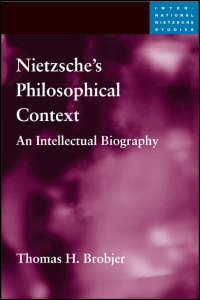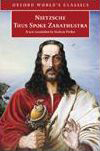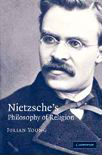Book Review
-
Nietzsche’s Philosophical Context: An Intellectual Biography By Thomas H. Brobjer
Reviewed by Daniel Blue
You may download the entire book review as Adobe PDF format clicking PDF icon on the left. If you need some clarifications about copyright or usage rights, please contact us at nceditors@ietzschecircle.com.
Page 1 | Page 2
 Shortly after German reunification when the Nietzsche Archives in Weimar became readily available to scholars, Thomas Brobjer decided to examine Nietzsche’s library,
the collection of volumes which the philosopher had carried around Europe and which were retrieved after his collapse. Many of these books, Brobjer discovered, were marked with exclamations,
underlines, and marginal notes. Such annotations, he recognized, could be valuable for Nietzsche studies, for they not only allowed scholarship to stipulate with varying degrees of confidence
what Nietzsche read but how he responded at the moments of encounter.His discoveries happened to coincide with a rising tide of research into Nietzsche’s reading. At least since the early 1960s1
scholars had been exploring the influence of Nietzsche’s contemporaries on his work. Figures as diverse as Afrikan Spir, J.C.F. Zöllner, Eduard von Hartmann, Eugen Dühring, and others were
examined, and a host of writers proved unexpectedly pivotal. Many of these investigations stressed the way Nietzsche shaped his ideas in response to the proposals of contemporaries. Others, more disquietingly,
revealed that certain passages in his work were variants on -- and occasionally word-for-word transcriptions -- of texts that Nietzsche had read.
Shortly after German reunification when the Nietzsche Archives in Weimar became readily available to scholars, Thomas Brobjer decided to examine Nietzsche’s library,
the collection of volumes which the philosopher had carried around Europe and which were retrieved after his collapse. Many of these books, Brobjer discovered, were marked with exclamations,
underlines, and marginal notes. Such annotations, he recognized, could be valuable for Nietzsche studies, for they not only allowed scholarship to stipulate with varying degrees of confidence
what Nietzsche read but how he responded at the moments of encounter.His discoveries happened to coincide with a rising tide of research into Nietzsche’s reading. At least since the early 1960s1
scholars had been exploring the influence of Nietzsche’s contemporaries on his work. Figures as diverse as Afrikan Spir, J.C.F. Zöllner, Eduard von Hartmann, Eugen Dühring, and others were
examined, and a host of writers proved unexpectedly pivotal. Many of these investigations stressed the way Nietzsche shaped his ideas in response to the proposals of contemporaries. Others, more disquietingly,
revealed that certain passages in his work were variants on -- and occasionally word-for-word transcriptions -- of texts that Nietzsche had read.
It was within this context that Brobjer began to publish his own discoveries. Because of his fascination with the extant volumes in Nietzsche’s library, he was able to bring evidence to bear on matters that had hitherto been speculative. He revealed, for example, that Nietzsche's schoolboy paper on Hölderin, a work which many scholars had taken at face value and used as an index of Nietzsche’s literary precocity, was strongly dependent upon a book he had borrowed and that Nietzsche had almost certainly not read several key works praised in that essay. He also showed that, although we have no evidence that Nietzsche actually read books by Marx or Kierkegaard, he was aware of both figures and some of their views. (Among other annotations, he underlined their names.)
Despite such accomplishments and his exceptional productivity -- Brobjer has published dozens of articles as well as translations2 -- he has until recently issued only one book in English, Nietzsche’s Ethics of Character, an academic dissertation which is out of print.3 In the past few months Brobjer has begun to compensate by publishing two volumes and indicating that others are planned. In one of the new books, Nietzsche’s Philosophical Context: An Intellectual Biography, he presents chronologically the works of philosophic import that Nietzsche read throughout his life. The key term in the title is “context,” which is implicitly a play on words. Brobjer sees Nietzsche within the context of his era but also within the texts of his era, the books that inspired or otherwise stimulated him in his efforts to construct a philosophy of his own.
Most studies of contemporary influences on Nietzsche limit themselves either to one or two authors or to a specific period in the philosopher’s life. Brobjer appears to be alone in citing the vast range of philosophic texts Nietzsche encountered and in attempting to survey the whole of his career from his days at Schulpforta to his final months of productivity. The only restriction he imposes in this endeavor is to confine himself to philosophic texts, discussing books on science, history, religion, the arts, or philology only when the impinge directly on philosophical issues. Brobjer's book is also distinctive in the way it draws on his knowledge of the physical condition of Nietzsche’s personal library. He usually knows not only which books Nietzsche bought and when -- he has examined the philosopher’s book bills -- but he is also aware which volumes are dog-eared, which are “spotted” with stains or other physical indications that the book had been opened to a specific page, and above all he knows the extent and nature of Nietzsche’s markings on the texts. He is thus in a position to present a comprehensive overview of Nietzsche’s philosophic reading from authors famous (Schopenhauer, Strauss, Spencer, Mill) to the comparatively obscure (Drossbach, Plümacher).
Brobjer is also poised to challenge, not just the more speculative hypotheses of scholars, but Nietzsche’s own account of his activities. For example, he quotes Nietzsche’s claim in Ecce Homo that he had read nothing in the six months since his perusal of Victor Brochard and shows that during that period the philosopher in fact read eight books and very likely some fiction as well. Brobjer is also skeptical of Nietzsche’s claim that “I take flight almost always to the same books, really a small number..,” followed by a list of these “favorite readings.” To this Brobjer dryly responds, “This listing is not particularly informative or reliable.” He proceeds to show that Nietzsche was on the contrary a wide-ranging and inveterate reader all his life.
In support of his theses, Brobjer discusses the bookshops Nietzsche patronized, the libraries he consulted, and the patterns of purchase he followed. As for those marginal annotations, Brobjer observes that Nietzsche rarely marked his books during his early years but began to handle them more freely during the 1870’s and annotated them copiously during the 1880’s. During the latter decades he tended to read with pencils in hand (often colored, red and blue), and he underlined words, scored paragraphs, or struck off comments in the margins, such as “N.B.” “gut!” “ja” “ecco” and (on occasion) “Esel” and “Vieh.” Nietzsche could be quite prolific in these responses. As Brobjer notes, “Many of the annotated books contain more than 10 annotations (mostly underlinings and marginal lines) per page for whole chapters.” 4
Having established the nature of Nietzsche’s reading habits in general, Brobjer embarks on a narrative of specific authors and books of philosophic interest that the philosopher read at various stages of his career. Here he follows the usual periodization of Nietzsche’s life, following a chapter on his childhood and youth with discussions of his so-called early, middle, and late periods. While he gives appropriate space to the central figures whom Nietzsche himself sometimes acknowledged as influences (Emerson, Strauss, Schopenhauer, Lange, the Pre-Socratics, Rée, and the French moralists), Brobjer also pays close attention to the dozens of less well-known authors whose writings contributed to Nietzsche’s philosophic thinking. To give an idea of the range included, we might mention (in addition to the authors cited above) books crucial for Nietzsche written in German by Fortlage, Radenhausen, Teichmüller, Mainländer, Hellwald, and Caspari. hen there are the French thinkers (Bourget, Brunetière, de Roberty) and the English (Spencer, Mill, Lecky, Buckle). Nietzsche read avidly writers on religion (Wellhausen, Jocolliot, Renan) and psychology (Höffding, Joly), not to mention critical positivists (Ernst Mach, Richard Avenarius). A plethora of names and titles fill every chapter, sometimes overwhelming the book artistically, yet undeniably building our appreciation for the constellations of authors that Nietzsche carried in his head and used to plot his own philosophical moves.
In the final chapter Brobjer touches obliquely on the question of the relevance and implication of all this cataloguing of Nietzsche’s influences, and, most pressingly, what it is meant to imply about Nietzsche’s susceptibility to influence. It might be noted that everybody reads, but creativity, the leap from what precedes oneself to a novel insight, cannot be explained by sources and arguably transcends them. No one except specialists looks at Shakespeare’s sources. Why should we look at Nietzsche’s?
continues on Page 2...
-
Thus Spoke ZarathustraBy Friedrich NietzscheA new translation by Graham Parkes
Oxford University Press, 2005
Reviewed by Horst HutterThis new translation of Nietzsche’s magnum opus is by far the best available in the English language. It should find its way to the desk of all students who do not have access to the original German.
-
Nietzsche’s Philosophy of ReligionBy Julian YoungCambridge University Press, 2006
Reviewed by Horst Hutter,
Concordia UniversityEvery student of Nietzsche in the Anglophone world should read this book. It is a most able treatment of a much-ignored and much-misunderstood topic close to the very heart of the writings of this seminal thinker.
Featured in the Agonist
-
Nietzsche, Music, and Silent Suffering An Introduction
By Yunus Tuncel, The New School University, New York City
...Focus on the impact of Nietzsche's knowledge of music on his philosophy and the development of his thought.
-
Music, Posthumanism and Nietzsche
By Stefan Lorenz Sorgner, Erlangen-Nuernberg
...the first order Empfindung associated to music is the dissolution of individuality which from a posthumanist[1] perspective brings about the realisation of the embeddedness of human beings in this world. Hence, music can bring about more than pain and pleasure in the recipients.
Support Us
Please consider donating! The NC is a not-for-profit organization. As an independent organization that receives no assistance from any institution, the NC relies on your magnanimity to sustain itself. Please help support the activities of the NC with a donation Donations of any kind, whether of money, services, equipment, or in-kind gifts, are all of great necessity and deeply appreciated.
Subscribe
To receive site updates, news, and announcement from NC via email. To do so, you simply need to provide your email address below.






